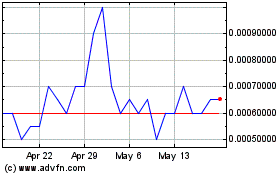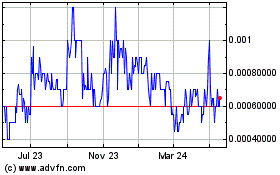VitiGam(TM) Inhibits Melanoma Growth in a Dose Dependent Manner
August 11 2008 - 7:30AM
Business Wire
GammaCan International, Inc. (�GammaCan� or �the Company�) (OTCBB:
GCAN), a developer of proprietary immunotherapies for the treatment
of melanoma and other cancers, today announced further progress in
its VitiGam� development program. In preparation for its upcoming
IND submission for VitiGam�, the Company successfully completed
additional experiments using its established mouse melanoma model.
These studies demonstrate a dose response of tumors (human melanoma
cells) when treated with IgG preparations derived from vitiligo
donors. In addition, the Company has conducted a meta-analysis (a
statistical analysis of a large number of experiments) based on a
series of previously announced studies with its mouse melanoma
model. The results of this meta-analysis further confirm the
effectiveness against melanomas of IgG preparations derived from
vitiligo donors. Using the A375 human melanoma cell line in SCID
mice, the Company demonstrated that vitiligo-derived IgG
preparations can prevent the growth of melanomas in a dose
dependant manner. In these studies, mice with subcutaneously
induced melanomas were treated with varying concentrations of
vitiligo-derived IgG preparations and compared to saline treated
mice. At higher doses, vitiligo-derived IgG preparations reduced
tumor sizes by fifty percent and greater when compared to lower
doses. The Company also conducted a meta-analysis to further
confirm the overall effectiveness of vitiligo-derived IgG
preparations against melanoma cells. This analysis revealed a
specific and highly statistically significant inhibition of tumor
growth in mice treated with vitiligo-derived IgG preparations.
Specifically, the Company observed that two separate pools of
vitiligo-derived IgG preparations were able to inhibit tumor growth
in a highly statistically significant manner (p=0.006) compared to
control mice receiving saline. In addition, this analysis
substantiated that anti-melanoma effects are specific to
vitiligo-derived IgG preparations. Tumors in mice treated with
vitiligo-derived preparations were significantly smaller (p=0.043)
when compared to tumors in mice treated with IgG preparations from
non-vitiligo donors. Steven Katz, Chairman of the Board and
President of GammaCan said, �These analyses confirm the validity of
our anti-melanoma program. Using our models, we have repeatedly
demonstrated that vitiligo-derived IgG preparations can prevent
tumor growth. Further, we have observed a dose response to
vitiligo-derived IgG-based therapy.� Mr. Katz further commented
that, �These positive results continue to keep us on track to file
our IND with the U.S. Food and Drug Administration in the near
term.� About GammaCan GammaCan develops proprietary immunotherapy
and related approaches to treat melanoma and other cancers.
GammaCan's patented platform technology is based on the use of IgGs
(gamma-immunoglobulins), a safe, relatively non-toxic human
plasma-derived product used to treat a variety of immune
deficiencies and autoimmune diseases. In cancer, IgG-based
therapies work by strengthening the patient's immune system. Many
experts currently view immunotherapy as a future alternative to
chemotherapy. The Company's lead drug candidate, VitiGam�, targets
Stage III and Stage IV melanoma for which no effective treatment
currently exists. In August 2007, VitiGam� received Orphan Drug
designation from the U.S. Food and Drug Administration (FDA) for
the treatment of Stage IIB to Stage IV metastatic melanoma. For
more information about GammaCan, visit www.GammaCan.com. About
VitiGam� VitiGam� is a first-in-class IgG-based anti-cancer
immunotherapy being developed for the treatment of Stage III and
Stage IV melanoma. GammaCan is planning to submit its
Investigational New Drug Application (IND) for VitiGam� to the FDA
in the near future. The Company expects to commence human clinical
trials shortly thereafter. VitiGam� is an IgG-based product
manufactured from the plasma of donors with Vitiligo, a benign skin
condition affecting up to 2% of the general population. Studies
have shown that this "enriched" IgG formulation contains potent
anti-melanoma activity. Based on these studies, GammaCan expects
VitiGam� to provide specific anti-melanoma activity against
melanoma cells, as well as non-specific anti-cancer activity. About
Melanoma Melanoma is a deadly form of skin cancer. According to the
American Cancer Society, melanoma accounts for approximately 4% of
all skin cancers but causes approximately 75% of all skin
cancer-related deaths. An estimated 62,500 people will be diagnosed
with metastatic melanoma (Stage III and Stage IV) in 2008; the
prognosis is poor since no effective treatment currently exists.
These patients have a median survival time of 8.5 months and a
5-year survival rate of less than 10%. There has been little change
in these results for in excess of 25 years. The incidence of
melanoma has increased more rapidly than any other cancer during
the past 10 years. The last drug to treat patients with metastatic
melanoma was approved by the FDA over 30 years ago. Safe Harbor
Statement Statements in this press release that are not purely
historical are forward-looking statements. Forward-looking
statements in this press release include statements regarding: the
commercialization of anti-cancer immunotherapies and the Company's
efforts to develop therapies to boost the immune systems of cancer
patients by the use of IgG-based therapy. Actual outcomes and the
Company's actual results could differ materially from those in such
forward-looking statements. Factors that could cause actual results
to differ materially include risks and uncertainties such as the
inability to finance the planned development of the technology; the
inability to hire appropriate staff to develop the technology;
unforeseen technical difficulties in developing the technology; the
inability to obtain regulatory approval for human use; competitors'
therapies proving to be more effective, cheaper or otherwise
preferable for consumers; the inability to market a product; all of
which could, among other things, delay or prevent product release,
as well as other factors expressed from time to time in GammaCan's
periodic filings with the Securities and Exchange Commission (the
"SEC"). As a result, this press release should be read in
conjunction with GammaCan's periodic filings with the SEC, which
are incorporated herein by reference. The forward-looking
statements contained herein are made only as of the date of this
press release and GammaCan undertakes no obligation to publicly
update such forward-looking statements to reflect subsequent events
or circumstances.
Greater Cannabis (PK) (USOTC:GCAN)
Historical Stock Chart
From Feb 2025 to Mar 2025

Greater Cannabis (PK) (USOTC:GCAN)
Historical Stock Chart
From Mar 2024 to Mar 2025
